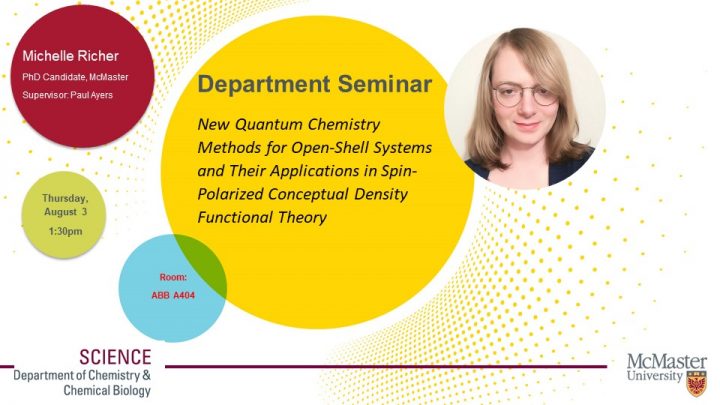PhD Seminar, Michelle Richer
Aug 3, 2023
1:30PM to 2:30PM
1280 Main St. W., Hamilton, Canada

Date/Time
Date(s) - 03/08/2023
1:30 pm - 2:30 pm
Location
ABB A404
Please join us next week for Michelle Richer’s PhD seminar, which will be offered in-person only.
Title: New Quantum Chemistry Methods for Open-Shell Systems and Their Applications in Spin-Polarized Conceptual Density Functional Theory
Date: Thursday, August 3
Time: 1:30-2:30
Room: ABB A404
Host: Paul Ayers
Abstract: Motivated by our frustration with the lack of quantum chemistry methods for strongly-correlated open-shell systems, we develop quantitative methods for computing the electronic structure of such systems and qualitative tools for analyzing their chemical properties and reactivity. Specifically, we present a modern framework for performing sparse configuration interaction (CI) computations with arbitrary (Slater determinant) n-electron basis sets, using restricted or generalized spin-orbitals, and including computation of spin-polarized 1- and 2- electron reduced density matrices (RDMs). This framework is then used to implement the flexible ansätze for n-electron CI (FanCI) method presented in [1] more efficiently, via increased vectorization in the FanCI equations and use of sparse CI algorithms. We also extended the FanCI approach, including least-squares and stochastic optimization techniques, the computation of spin-polarized 1- and 2- electron RDMs, and transition energies (ionization potentials, electron affinities, and excitation energies). We use these tools to compare various open-shell CI methods and FanCI methods based on various antisymmetrized product of nonorthogonal geminals ansätze [2]. To translate the vast amount of quantitative data present in the energies and (spin-resolved) density matrices of multiple open-shell states, we present a new, internally consistent and unambiguous framework for spin-polarized conceptual density-functional theory (SP-DFT) that reduces to a sensible formulation of spin-free CDFT in an appropriate limit. Using this framework, we were able to generalize the (non-spin-polarized) Parr function [3]. We can also, using this framework, construct promolecules with proatoms having non-integer charges and multiplicities. Finally, we describe an equations-of-motion-based method for computing spin-polarized reactivity descriptors of a chemical system from only the ground state energy and the 1- and 2- electron RDMs from a single-point electronic structure computation, and show some benchmark computations for this method based on various CI and FanCI electronic structure methods.
[1] T. D. Kim, R. A. Miranda-Quintana, M. Richer, and P. W. Ayers. Flexible ansatz for N-body configuration interaction. Computational and Theoretical Chemistry 1202 (2021), 113187. DOI: 10.1016/j.comptc.2021.113187.
[2] P. A. Johnson, P. A. Limacher, T. D. Kim, M. Richer, R. A. Miranda-Quintana, F. Heidar-Zadeh, P. W. Ayers, P. Bultinck, S. De Baerdemacker, and D. Van Neck. Strategies for extending geminal-based wavefunctions: Open shells and beyond. Computational and Theoretical Chemistry 1116 (2017), 207–219. DOI: 10.1016/j.comptc.2017.05.010.
[3] L. R. Domingo, P. Pérez, and J. A. Sáez. Understanding the local reactivity in polar organic reactions through electrophilic and nucleophilic Parr functions. RSC Advances 3(5) (2013), 1486–1494. DOI: 10.1039/C2RA22886F.
